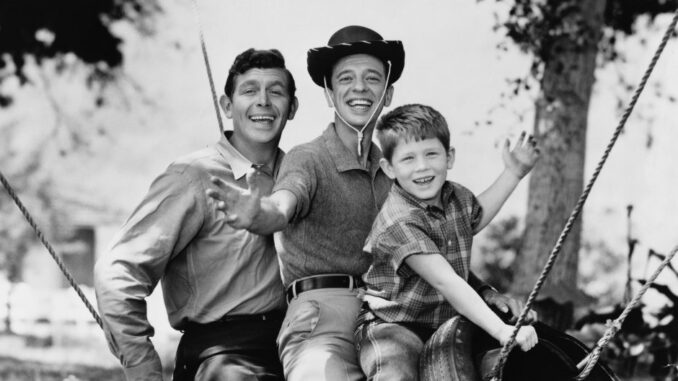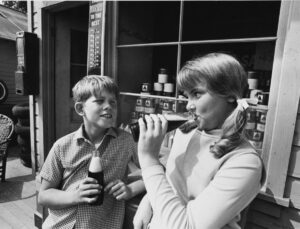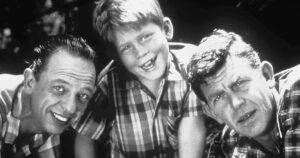
When we think of child stars, few names shine as brightly as Ron Howard, who won the hearts of viewers as the charming Opie Taylor on The Andy Griffith Show. But behind the scenes, young Ron had a surprising attitude toward his role. Despite being an integral part of the show, he initially resisted watching himself on screen. Why did this talented young actor feel uncomfortable viewing his own performances? Let’s dive into the intriguing story behind Ron Howard’s unique experience on the show and how he eventually overcame his reluctance.
1. The Early Days of Ron Howard’s Career on ‘The Andy Griffith Show’
Ron Howard’s career took off early, landing the role of Opie Taylor when he was just six years old. Howard’s natural charisma and authentic acting style made him an instant favorite, but he wasn’t always thrilled about seeing himself on TV.
2. A Child Actor’s Unique Challenge: Watching Yourself Act
For many child actors, seeing their work on screen is exciting. But for Ron, the experience was uncomfortable. At such a young age, he found it strange and unsettling to watch himself pretend to be someone else.

3. Why Did Ron Howard Avoid Watching His Own Episodes?
While it’s common for actors to be critical of their performances, Ron’s hesitation to watch himself went beyond self-critique. He later explained that he felt embarrassed seeing himself on screen, a feeling not uncommon among young performers who are still developing self-awareness.
4. Parental Influence: The Role of the Howard Family
Ron’s parents, Rance and Jean Howard, were instrumental in shaping his early career. They encouraged him to focus on the craft rather than on fame or public opinion. This approach allowed Ron to stay grounded, which may have influenced his choice to avoid watching himself on The Andy Griffith Show.
5. Learning by Acting, Not by Watching
For Ron, the learning experience on set was far more valuable than analyzing his performances afterward. Howard found that being present with experienced actors like Andy Griffith and Don Knotts helped him improve his craft. He didn’t feel the need to study himself on-screen because the lessons he learned in real time were far more impactful.
6. Andy Griffith’s Supportive Mentorship
Andy Griffith played a pivotal role in shaping Ron Howard’s career. Griffith recognized the young actor’s talent and offered gentle guidance, making him feel comfortable on set. This support helped Ron develop confidence without relying on external validation, such as watching his own episodes.

7. Gaining Confidence as Opie Taylor
As he grew more comfortable with his role, Ron slowly began to develop the confidence to embrace his character fully. Playing Opie Taylor became second nature, allowing him to give his best performances without the need to evaluate them afterward.
8. Did His Reluctance Impact His Acting Performance?
Ironically, Ron Howard’s reluctance to watch himself may have contributed positively to his performance. Without the distraction of self-criticism, he was able to focus entirely on embodying Opie, resulting in a genuine portrayal that resonated with audiences.
9. Transitioning from Child Actor to Acclaimed Director
Ron Howard’s early years on The Andy Griffith Show set the foundation for a remarkable career in Hollywood. The discipline he developed helped him make a smooth transition from actor to director, where his unique approach to storytelling has been widely celebrated.
10. How Ron Howard Finally Overcame His Reluctance
As he matured, Ron grew more comfortable with watching his own work. By the time he became a director, analyzing film became part of his process. Viewing his own performances in hindsight offered insights into acting and directing, helping him improve in both arenas.
11. Ron Howard’s Legacy on ‘The Andy Griffith Show’
To this day, The Andy Griffith Show remains a beloved classic, and Ron Howard’s performance as Opie Taylor is a big reason why. His journey from a self-conscious young actor to a confident director has inspired countless fans and industry professionals.
12. The Evolution of Ron Howard’s Perspective on His Early Work
Looking back, Ron Howard has acknowledged the impact that The Andy Griffith Show had on his life. While he may not have enjoyed watching himself at the time, he now appreciates the experience as a vital part of his growth.
13. How Other Actors Handle Watching Themselves
Ron’s initial discomfort isn’t unique—many actors struggle with viewing their own work. The experience can be surreal, especially for those who started acting at a young age. For Ron, this reluctance ultimately shaped his approach to the industry.
14. The Impact of Childhood Fame on Ron Howard’s Career Choices
Ron’s experience on The Andy Griffith Show gave him an inside look at Hollywood’s ups and downs. Rather than capitalizing on his child star status, he chose to explore new avenues, eventually becoming one of Hollywood’s most respected directors.
15. Conclusion
Ron Howard’s journey on The Andy Griffith Show is a testament to the challenges and rewards of childhood stardom. His initial reluctance to watch himself on-screen is a relatable struggle that adds a layer of humanity to his story. Overcoming that discomfort and growing into a celebrated director reveals the resilience and dedication that have driven his career. From Opie Taylor to Academy Award-winning director, Ron Howard’s journey shows that sometimes, the best way to improve is by focusing on the craft itself rather than the finished product.
FAQs
1. Why didn’t Ron Howard want to watch himself on The Andy Griffith Show? Ron Howard felt uncomfortable seeing himself act, finding it unsettling to watch his own expressions and mannerisms on screen as a young actor.
2. Did Ron Howard’s parents support his decision not to watch himself? Yes, his parents encouraged him to focus on learning rather than seeking validation, helping him develop a grounded approach to acting.
3. How did Andy Griffith help Ron Howard on the show? Andy Griffith provided mentorship and support, helping Ron feel more comfortable and confident on set, which contributed to his growth as an actor.
4. When did Ron Howard start watching his own performances? As he matured and moved into directing, Howard became more comfortable with viewing his work, recognizing it as an essential part of learning.
5. How has Ron Howard’s career evolved since The Andy Griffith Show? Ron Howard transitioned from acting to directing and has become one of Hollywood’s most respected filmmakers, known for his storytelling and directing expertise.